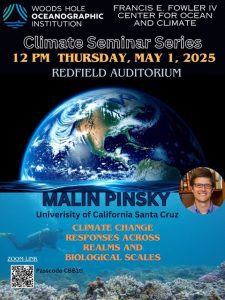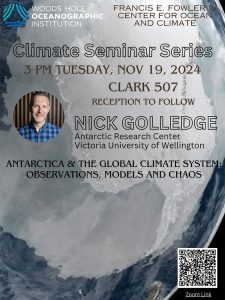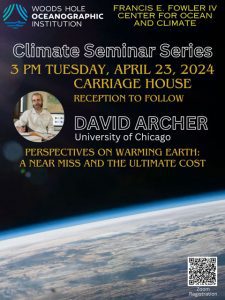A new seminar series was launched in 2024 as an opportunity for WHOI scientists to invite external speakers of international repute for a seminar and discussions on climate and the oceans. The goals are to:
- Promote interdisciplinary science on the ocean’s role in climate
- Provide the opportunity for students, postdocs and WHOI scientists to interact with an external scientist
- Create community and inter-departmental collaboration within WHOI
Upcoming Events
Thursday, May 1, 2025 • 12 PM • Redfield Auditorium
Climate change responses across realms and biological scales
Malin Pinsky, Ecology & Evolutionary Biology, University of California Santa Cruz

Zoom
Passcode: CBB1t!
Tuesday, May 13, 2025 • 12 pM • Clark 507
On microbes and particles: The ocean at the microscale
Roman Stocker, ETH Zurich

Past Events
Tuesday, November 19, 2024 • 3 pm
Antarctica and the global climate system: Observations, models, and chaos
Nick Golledge, Antarctic Research Centre, Victoria University of Wellington

View video
Passcode: *PFws8u#
Tuesday, April 23, 2024 • 3 pM
Perspectives on the warming Earth: A near miss and the ultimate cost
David Archer, University of Chicago

View video
Passcode: 7s.hHe+@
